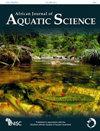贝叶斯网络在淡水生态系统水质风险评价中的应用
IF 1
4区 环境科学与生态学
Q3 MARINE & FRESHWATER BIOLOGY
引用次数: 3
摘要
很难预测和管理多种水质压力对我们淡水系统的生态影响。这是由于源-压力-反应关系的动态性和多种因素造成的,包括缺乏数据、复杂的影响途径和风险,以及难以参数化的不确定性。我们提出了一种基于风险的概率建模方法,使用贝叶斯网络(BN)来管理多个空间尺度上的多种水质压力源。我们通过评估南非三条案例研究河流中与多种来源相关的水质变化的可能生态影响,说明了这种方法的使用。水质和土地利用活动用于描述概念风险途径,参数化BNs,并对多种水质压力源的可能后果进行建模。BN模型表明,为研究选择的终点反映了与输入水质变量水平相关的风险。该模型进一步证明了电导率BN与更复杂的盐模型一样敏感。BN模型进一步能够准确地表示所有系统的风险,而不考虑水质数据库的大小。这种方法有助于实现更可持续的水资源管理。本文章由计算机程序翻译,如有差异,请以英文原文为准。
The application of Bayesian networks to evaluate risks from multiple stressors to water quality of freshwater ecosystems
It is difficult to predict and manage the ecological consequences of multiple water quality stressors on our freshwater systems. This is due to the dynamism of the source-stressor-response relationships and multiple factors including lack of data, complex impact pathways and risks, and uncertainties that are difficult to parameterise. We present a risk-based probability modelling approach using a Bayesian network (BN), to manage multiple water quality stressors at multiple spatial scales. We illustrate the use of this approach, by evaluating the probable ecological effects of altered water quality associated with multiple sources in three case study rivers in South Africa. Water quality and land use activity were used to describe conceptual risk pathways, parameterise the BNs and model the probable consequences of multiple water quality stressors. The BN model demonstrated that the endpoints that were selected for the study reflected the risks associated with the levels of the input water quality variables. The model further demonstrated that the electrical conductivity BN was just as sensitive as the more complex salt model. The BN model was further able to accurately represent risks to all systems irrespective the water quality data base size. This approach can contribute towards more sustainable water resource management.
求助全文
通过发布文献求助,成功后即可免费获取论文全文。
去求助
来源期刊

African Journal of Aquatic Science
MARINE & FRESHWATER BIOLOGY-
CiteScore
3.90
自引率
7.10%
发文量
31
审稿时长
>12 weeks
期刊介绍:
The African Journal of Aquatic Science is an international journal devoted to the study of the aquatic sciences, covering all African inland and estuarine waters. The Journal publishes peer-reviewed original scientific papers and short articles in all the aquatic science fields including limnology, hydrobiology, ecology, conservation, biomonitoring, management, water quality, ecotoxicology, biological interactions, physical properties and human impacts on African aquatic systems.
 求助内容:
求助内容: 应助结果提醒方式:
应助结果提醒方式:


